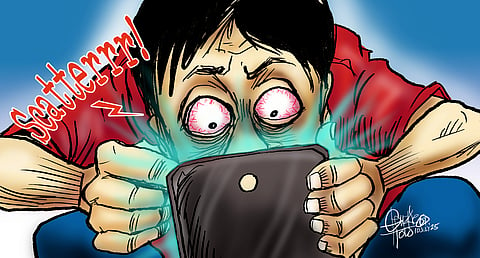
- NEWS
- the EDIT
- COMMENTARY
- BUSINESS
- LIFE
- SHOW
- ACTION
- GLOBAL GOALS
- SNAPS
- DYARYO TIRADA
- MORE

In what could be one of the boldest policy proposals of the year, Senator Juan Miguel Zubiri has filed a bill seeking an outright ban on all forms of online gambling in the country.
Citing its insidious impact on the nation’s moral and financial fabric, Zubiri describes online gambling as a “silent epidemic” that, while largely unnoticed, is quietly devastating Filipino families, particularly minors and the most economically vulnerable sectors.
The proposal, if passed, would criminalize digital betting platforms, mobile apps, and websites that enable users to wager using their phones, tablets, or computers.
This move comes amid rising concerns that online gambling poses a threat that may be even greater than the controversial Philippine Offshore Gaming Operators (POGOs) industry, which has long been linked to crimes such as money laundering, human trafficking and corruption.
But unlike POGOs — whose operations are usually confined to foreign nationals and call center-style setups — online gambling has a direct, unfiltered reach into the homes of Filipinos. With just a few taps on a smartphone, anyone can place a bet, from a construction worker to a high school student.
The accessibility and anonymity of online gambling make it particularly dangerous. A person no longer needs to visit a casino or an underground betting den; he simply needs an internet connection and a mobile wallet. This frictionless access creates a dangerous loop of instant gratification, leading to addiction, mounting debts, and the erosion of financial responsibility.
Unlike traditional forms of gambling, online betting operates 24/7, encouraging compulsive behavior with no built-in breaks or closing hours.
The victims are not only the gamblers themselves. Families suffer when breadwinners squander salaries chasing jackpots. Youths are enticed by flashy ads and influencer promotions promising easy money and high-stakes excitement. Studies abroad link online gambling to increased rates of depression, anxiety, and even suicide. The Philippines, with its weak digital safeguards and minimal mental health support infrastructure, is ill-prepared for the psychological fallout.
Critics argue that the government is partly to blame for this mess. Agencies like the Philippine Amusement and Gaming Corporation (PAGCOR) have licensed e-sabong and other online betting platforms in exchange for hefty revenues. PAGCOR’s justification — that gambling profits fund national development projects — now rings hollow as the social costs of gambling begin to outweigh the financial gains. In essence, the state has become both referee and player in a game stacked against its own people.
Supporters of the ban say Zubiri’s proposal is not just timely — it’s long overdue. Much like the campaign against e-sabong that eventually led to its ban, this bill recognizes that regulation has failed to prevent abuse. Instead of patchwork measures like age-verification prompts and betting limits, what the country needs, they argue, is a decisive moral stand.
Still, opponents raise legitimate concerns. A total ban could drive the industry underground, making it even harder to monitor and control. Others worry about lost jobs and revenues. But these issues, while valid, cannot eclipse the long-term harm online gambling is inflicting on a defenseless society.
The question now is whether lawmakers will have the political will to pass this bill or if it will suffer the fate of similar efforts against vice industries in the past — watered down or buried in committee.
For now, one thing is clear: Online gambling may be digital in nature, but its consequences are deeply real, cutting across generations and socioeconomic classes.
If left unchecked, this silent epidemic may become one of the loudest crises of our time.
